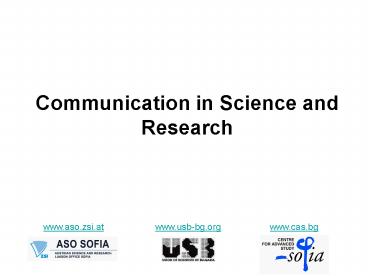Communication in Science and Research - PowerPoint PPT Presentation
1 / 16
Title:
Communication in Science and Research
Description:
R&D expenditure as share of GDP 0,4/0,5% (4 times less than EU 15, 2 times ... bring results and experience from satelite research again in the institution back ... – PowerPoint PPT presentation
Number of Views:42
Avg rating:3.0/5.0
Title: Communication in Science and Research
1
Communication in Science and Research
www.aso.zsi.at
www.usb-bg.org www.cas.bg
2
- The next few slides
- 1.) Information about Bulgaria
- 2.) ASO Sofia
- 3.) Communication in Science
- and Research
3
Science in Bulgaria
- RD expenditure as share of GDP 0,4/0,5
(4 times less than EU 15, 2 times less NMS) - Business expenditures only 21,8
- 2,7 Researchers/1.000 (Finnland 13,8!!!)
- 8000/Exp./Year/Scientist ... in Austria 20-35
times more expenditures per head researcher - headcount researchers2003 17.400
1991 112.158 sixfold - Bulgarian Academy of Sciences(BAS) - 45
(1995-2001), actual personnel around 6000
Researchers Fulltime Eqivalent in Europe in the
same periode 11 - 228.468 students at 42(45) tertiary educational
institutions, around 25.000 students at Sofia
University
4
Science in Bulgaria
- Outdated infrastructure
- Information gap Access to scientific information
(libraries etc) - Brain drain effects
- Institutional structural deficits
- Lack of links between Universities - Research
Institutes - Bulgarian academy of Sciences(BAS) -
Industry - Lack of information and experience to apply for
European funds- no open information unit like the
FFG in Austria, but a splitten NCP-Structure in
the EU-FPs
5
Bulgaria Improvements
- Stabilization institutional/personnel
- Innovation strategy 2005, Innovation Fund 2,5 Mio
- Science and Research strategy 2005
- new measurements towards universities (HEI),
Young scientists, support for international and
regional co-operation, infrastructure, human
resources (PostDocs) - National Science Fund (NSF) is still
underfinanced - Priority fields of science
- Biotech
- IT
- New Materials
- National Identity
6
Bulgaria Improvements
- Reliable partner in FP5 and FP6 (BAS 27 success
rate) ... FP7 maybe with a twofold budget! - Regional relevant partner eg. SEE-ERA NET, a
interministerial network to improve bilateral
towards multilateral co-operation, co-ordinated
by CSI - Ministry of Education and Science Bulgaria more
ambitious goals and visions, more strict
criterias set - Participating in COST, JRC, ESF, INTAS, CEI,
SCOPES(CH), UNESCO-ROSTE and many more Activities - ...on the way to find its position in the ERA
7
Science and Technology Position of Bulgaria in an
enlarged EU
- European Research Area (ERA) -Which ERA will be
created and how? - European Higher Education Area (EHA) -Bologna
process Which kind of specialists are needed and
how do they compete international - Brain drain? - Lissabon targets - What can the Bulgarian
contribution be to make Europe the most
competitive world economy? - Structural funds - How can they be used efficient
for science and research?
8
How to run bilateral co-operation in Science?
- ASOs are not a typical funding agency
- Needs analysis and expertise
- Support for preparatory and start up activities
for joint research projects - Linking initiatives in A/BG/SLO/SEE
- Networking with other relevant activities of
European programmes and initiatives, e.g. with
UNESCO - Added value for Austria
- Annual call for proposals Open call at the
moment Science and Society Nexus (go to our
webpage)
9
Organisation and Scientist
Developing the own career
Institution...
Developing own networks in specialized fields
- Administrative function
- Setting priorities of Research?
- Institutional networks
- Providing Resources
- Improving HR
- Communicating Results
Additional income
More has to be discussed and decided than
Communication in Science and Research
10
Changing environment for Scientists
A good researcher has to
Attract funding
- Manage Projects
Develope new networks
Integrate Young Scientist
can organisations manage proactive scientists
??? what is the vital mutual interest of both,
the research organisation and the scientists?
How to manage proactive and creative inventors
and to keep them at the institution
11
Changing Situation for Organisations
- Being aware of mutual interests of Scientists and
providing the appropriate resources to keep them
at the institutions or to reintegrate initiatives - Accepting new modes of research approaches
Giving up traditional models - Interinstitutionality Proactive development
with new partnerships - Interdisciplinarity - confrontation with
different ideas - Providing information and advice for new
programmes - Finally To be attractive for Scientists working
together with the institution in a win-win
situtation
12
Communication in Science and Research
- Changing Environment for Research
- Knowledge-based society Information Society
- Governance Communicating Science with society
- Societal changes are influencing the academical
life and research, new project oriented approach,
based on competition and rivalness - Scientistswork project oriented
- Research organisations dealing with project
oriented researchers
13
Communication in Science and Research
- Institutional point of view
- setting of priorities in the institution
profile - ideological framework and scientific school
- availability of resources
- Key questions / challenges
- Level of centralisation (setting of research
priorities) - System for exchange of experiences in project
management - How to bring results and experience from
satelite research again in the institution back
14
Communication in Science and Research
- Researchers point of view
- Usage of networks established for own purposes,
also international friends also in concurrency
with the homeinsitution - Maximalisation of the low sallaries paid by the
institution - Dealing with expectations/benchmarks set by the
institution - Integration in a few research and educational
insitutions - Key questions
- Personlized vs. professionalized partnership
- Limited resources of personal networks
- to have a good relation of give and take
(scientist-organisation)
15
Communication in Science and Research
- What type of information has to be passed on?
- internal-knowledge to colleagues, young scientist
- external-dissemination, to reach thematical
leadership - How do Research Units organize their internal
communication
16
Thank you for your attention! Initiatives for
future co-operation are welcome!
Austrian Science and Research Liaison
Office Sofia Martin Felix Gajdusek (Head of the
office Sofia) aso-sofia_at_zsi.at www.aso.zsi.at































